[Before you download, please fill out our survey first. Thank you]
CyberTuner and Tunelab
I’ve now worked with both Tunelab and Cybertuner piano tuning software. I trained as an aural tuner and tuned that way until about 2005. There has traditionally been a prejudice against electronic tuning devices primarily because of the inaccurate machines that were available prior to the late 1970’s when Albert Sanderson introduced his Accu-tuner.
The application of modern computer technology brought an accuracy and flexibility that the early machines couldn’t even dream of. Slowly more and more aural tuners are using them in various ways.
The customary way of using a modern ETD is to calculate the stretch for the piano you’re working on, and then start with A0 and go up chromatically to C8. This procedure is quite different from the sequence used in aural tuning where the core octave in the center of the piano is tuned first and then spread out chromatically in both directions. Many aural tuners keep to this tradition, using the machine to set the temperament octave and then aurally tuning out from there.
I’ve completely integrated an ETD into my tuning sequence in a different way. I tune the whole piano from bottom to top with the device. I then go back over the complete piano using primarily ear. I’ve found that using the ETD allows me to go through the first pass so quickly that my careful double tunings take no more time.
I started with the Reyburn Cybertuner but it was running on an old HP Ipaq that finally gave up the ghost. The new Reyburn version only runs on the Apple IOS and I’m an Android guy, so what to do?
Move to Tunelab, that’s what to do. I really like the software, easy to use and I’m able to tweak it to give me the reduced stretch that I prefer. The new ETD software, like Tunelab and Cybertuner, is amazingly sensitive and precise, but it will not automatically give you a great, musical tuning with clean, clear unisons. The ear is still very important.
Which do I prefer? I like them both but there are some differences. The pitchraise function works a little better on Cybertuner. You do pitch raises on the fly, with the device calculating the overpull as you tune each note. With Tunelab you have to sample each key, or you have the option of sampling only the white keys. Then you go back and do the overpull tuning. This takes a little longer but I find the overpull on the Tunelab works just as well as Cybertuner, just not as quickly.
iRCT is computer software that transforms an Apple iOS hand-held computer into the most advanced visual piano tuning device available. New iRCT version 7.0.5 now available on the App Store! This is a FREE and recommended upgrade for all CyberTuner for Apple iOS users.
What's New for recent iRCT versions:
1. Smart Tune mode saves Strut Note data! Next time you use the same tuning record, the strut notes will be entered automatically.
2. Default Start Note feature works with Smart Tune and Pitch Raise modes.
3. Lowest Tenor Note can be used ad Default Start Note for any tuning mode.
4. Expanded storage for piano serial number, and any character can be stored in this field.
5. New Global A4 pitch lets you set your standard pitch to A440, 441, 442 or 443. (CyberEar can still set any pitch from A400 to A450)
6. Chameleon Smart Partials now has two settings for low bass stretch, Low and Standard giving more versatility to the Smart Partials feature.
7. New iOS 7 interface with upgraded hi-res graphics when running in iOS 7. iOS 7, 8 and 9 supported. (older iCloud versions support iOS 5 & 6.)
8. Piano Technicians Guild RPT Tuning Exam. For the first time, see final scores in 6 out of 8 sections.
9. Aural Tutor expert system analyzes your aural tuning and suggests intervals and check notes for improving your aural skills. Aural Tutor is invaluable if you're studying for the RPT exam, or just trying to refresh or improve your aural skills.
10. Landscape CyberEar upgraded to include tuning header. Choose new note from the landscape graphic keyboard.
11. Automatic update message informs you when a new iRCT version is available on the App Store!
12. CyberEar remembers more of your important settings even after exiting the app.
13. Improvements in interface, speed, stability and bug fixes.
Why is Reyburn CyberTuner the visual tuning device preferred by so many professional piano tuners?Reyburn CyberTuner for iOS (iRCT) is the only piano visual tuning device to take full advantage of an iOS device. iRCT shares the same proven accuracy and most features with RCT running on older platforms.
iRCT accommodates all experience levels, giving beginning tuners a very simple interface, but offers advanced tuners unlimited customizable stretch choices.
New for iRCT! New Concert Tune mode combines the best of Fine Tune and Smart Tune but customized for 7 and 9 foot concert instruments.
Faster and higher resolution spinner than has ever been possible with RCT before. We've taken full advantage of OpenGL and the Graphics Processing Units on iOS hardware.
Even small pitch changes are extraordinarily accurate and fast with iRCT.
The RCT "CyberCloud" automatically keeps iRCT calibrated to A440.0.
iRCT creates super-accurate tunings from low bass to high treble because careful and accurate multi- partial samples are taken from five or six notes (A1, A2, A3, A4, A5 and A6). All partials are automatically measured and recorded to a hundredth of a cent!
iRCT creates aural-quality tunings because it directly matches sampled partials - exactly what aural tuners do every day.
Small (and all scale-challenged) pianos never sounded better! iRCT automatically senses and compensates for short scaling in spinets, small grands, etc.
RCT tuning files can be imported from RCT Mac/Win or Pocket RCT via email or iTunes file share.
Super easy Historical Temperaments includes the ability to create your own custom temperaments. 114+ temperaments are built-in, add hundreds more custom temperaments from any source.
New! Study for the PTG RPT Exam, or brush up on your aural skills with the new Aural Tutor expert tuning system.
iRCT has several primary software components; Chameleon , CyberEar , Tuning Graph , PTG Exam scoring and Aural Tutor
Chameleon
Simple to use! Tap the Record button, and Chameleon indicates the note to play, then automatically measures and records.
New "Smart Partials" feature chooses the right partial for every piano! "Smart Partials" automatically chooses the optimal partial for each piano based on octave type feathering, partial loudness, inharmonicity and piano size among other factors. User can turn off Smart Partials feature in the rare case where the user needs more control.
It's easy to choose from ten stretch styles, from pure to very wide or RPT Exam style to emulate a PTG exam Master Tuning.
Want even simpler? RCT can automatically choose optimal stretch and partials.
Tap the Calculate button, and Chameleon creates an 88-note tuning in less than a second by directly matching partials - just like aural tuners do every day!
Auto-compensates for spinets and other "scale-challenged" pianos.
RCT is the only tuning device which can automatically adjust the overall stretch of the tuning to be opitmal for each piano.

![CyberTuner and Tunelab Download Free [Jailbreak]](https://www.reyburn.com/images/irctch3advanced.png)
CyberEar & Tuning Graph
Spinner rotates to indicate pitch deviation in cents or beats (you choose!), moves to left or right to intuitively show large pitch deviation, target blushing if within 0.3 cents or beats for super fine accuracy, adjustable sensitivity, change spinner colors, and more.
Portrait or Landscape and auto rotation to any of the four positions fully supported.
Unsurpassed fast and accurate one-pass pitch raising because CyberEar automatically measures and offsets every note using optimized overpull percentages ranging from 4% to 38%.
Automatic hands-free both-ways chromatic note switching. Works on all partials, even up to partial 16 in bass.
Tune and Offset cents readings, piano and customer name, unlimited pitch settings, tuning partial and number displayed, accuracy, resolution and repeatability to 0.01 cents.
Simple to reset pitch; current setting always displayed.
CyberEar switches to full-screen mode with 88 note keyboard display.
Tuning Graph shows cents and partials for all 88 notes The shape of this graph can indicate the quality of the samples and tuning.
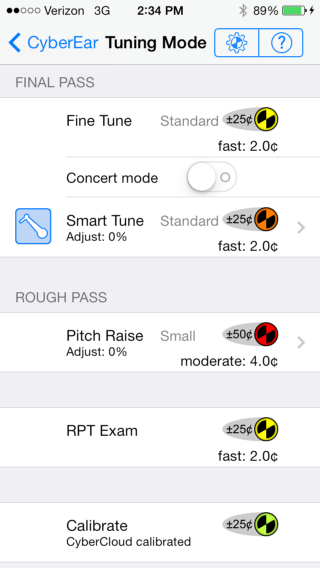

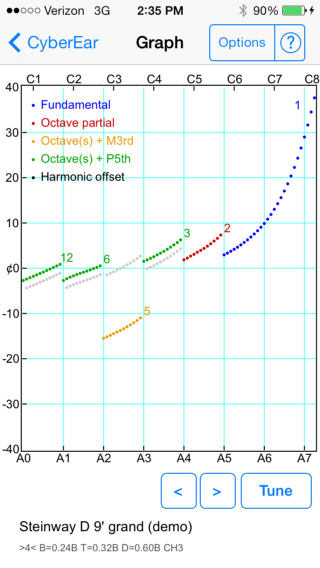
Piano Technicians Guild RPT Exam Scoring
Piano Technicians Guild RPT Tuning Exam. For the first time, see final scores in 6 out of 8 sections.
iRCT shows a Points chart and final scores, the easiest and most complete RPT Exam scoring system ever for RCT.
Exam scoring is tightly integrated with the new Aural Tutor expert system (see below).
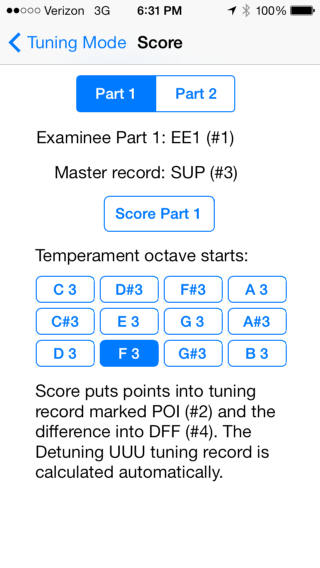


Aural Tutor
Aural Tutor (AT) expert system analyzes your aural tuning and suggests intervals and check notes for improving your aural skills.
AT is invaluable if you're studying for the RPT exam, or just trying to refresh or improve your aural skills.
AT shows you the three intervals, in order of preference for each note which show that note is out of tune.
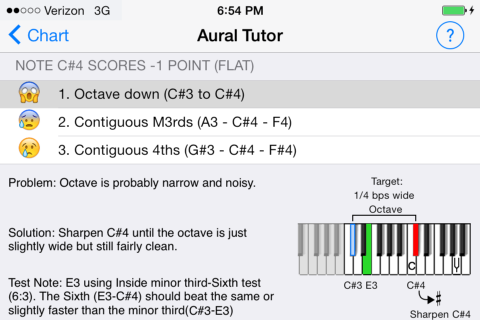
Pianalyzer!
Pianalyzer is a specialized spectrum analyzer designed specifically for pianos.
Perfect for visually showing customers what their instrument needs (tuning or voicing).
Great for troubleshooting tuning problems, and for piano tone/string comparisons.
New for iRCT! Pianalyzer saves all 88 notes' data.
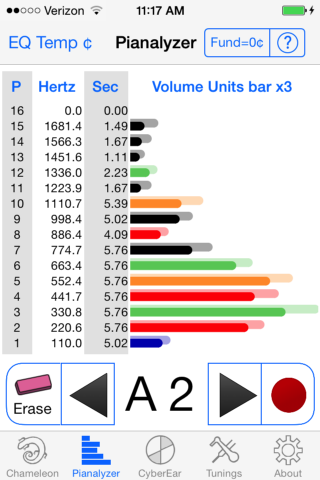
File sharing using iTunes
iRCT imports and exports easily to almost any older RCT version and platform.
Import/export feature uses the standard iTunes file sharing interface.
iRCT also emails and receives tuning files (to yourself for backup or another iRCT user) using Apple Mail.
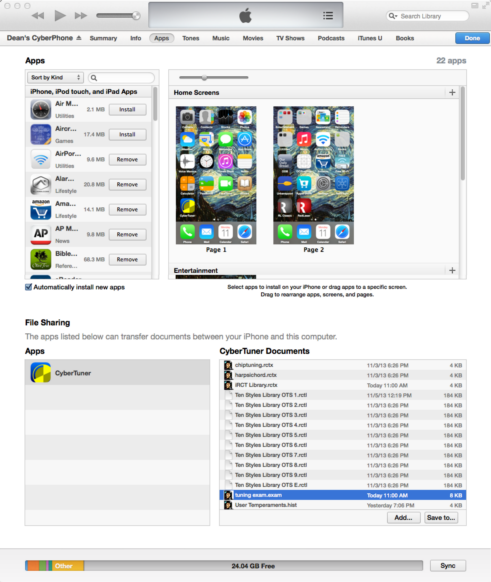
CyberCare subscription
iRCT includes one free year of CyberCare subscription. CyberCare enables premium mode (ability to tune all 88 notes), CyberCloud A440 auto-calibration, and covers all new upgrades and support during the subscription period. After one year the subscription cost is $79.99 USD per year (price is similar but varies in other currencies), discount available for multiple year purchase, FREE CyberCare subscriptions are avialable if you refer a colleague or help us improve iRCT, see the CyberCare page for details. If your CyberCare Subscription lapses, iRCT will continue to function in original Standard mode (ability to tune a 13 note temperament from A3 to A4) .
Why CyberCare? In the past on older platforms we released major new versions every year or two with typical upgrade costs of 10% to 25% of the orginal software license cost. CyberCare takes the place of these upgrade costs and makes sure your license is always up-to-date, and runs on the latest Apple iOS and iPhone, iPad or iPod touch. In past or with other software, when users had to purchase new hardware, an expensive upgrade would often be needed at the same time as hardware purchase; the timing couldn't be worse. With CyberCare our users will never have to pay extra for software upgrades.
Our company plans to continue offering the best software tuning device and best support in the professional piano tuning software business for many years to come, CyberCare insures that we'll be there, providing support and upgrades and protecting your pro tuning software investment.
Put another way, when's the last time you purchased some software, computer or other hardware with significant technology, simply to have that investment degraded or made obsolete a month, a year or two years later? CyberCare makes sure that can't happen by protecting your investment. CyberCare is our solution to "future-proof" CyberTuner, making sure you always have the latest RCT technology and software compatibilty.
Support: We have support teams based in the USA, Japan and Europe who speak the local language and are all working piano tuners using iRCT professionally to tune pianos. CyberCare supports our team of profressional piano technicians, all of whom are PTG/RPT certified or equivalent.
CyberTuner for iOS is the only pro piano tuning device which is built for Apple's iOS 7, 8 & 9, takes full advantage of the iPhone 5 and iPhone 6 & 6 plus larger screens, A7/A8 - 64 bit cpu, OpenGL and GPU hardware. We promptly keep iRCT up-to-date for our users to run on the latest Apple iOS hardware and operating systems. CyberCare funds this development!
CyberCare can be purchased "in-app" for your convenience, or you can purchase muliple years at a discount online on the CyberCare page. CyberTuner users can earn FREE CyberCare by referring a colleague, reporting bugs, suggesting changes etc... See the CyberCare page for details.
System requirements for iRCTApple iOS 7.0 or later device. Optimized and tested on iPhone 5, 6, 6 plus and iOS 7/8/9. iPhone 4, iPod touch 5 or later recommended. 8gb memory minimum, 16gb recommended. Occasional mobile phone or wifi connection required to calibrate A440 and confirm CyberCare subscription. iRCT runs on iPad in iPhone mode either 1x or 2x size.
Availability and Installation
iRCT is now available from from Apple's iOS App Store. Purchase iRCT using your iOS device or on any computer with iTunes installed. iRCT can be moved quickly and easily moved from one compatible iOS device to another, calibrating and restoring in one or two minutes.
Each iRCT copy is a single user license for one piano tuner's use at a time, although it may be installed on multiple iOS devices as a backup.
Q: Which should I choose, iPhone, iPod or iPad?
A: If you're unsure, we recommend the latest iPod Touch, or iPad mini. These models haves a low initial cost and no phone contract. If you don't have occasional access to wifi, an iPhone or iPad with mobile phone connection may be the best choice. If you later decide on an iPhone or full-size iPad, your iPod or iPad mini is a great backup device! However, if you need a new smart phone, we can recommend the iPhone 4/4s or 5 as a great choice. iRCT is fully integrated into iOS. You can take a phone call or text while tuning with no problem.
Q: How to I obtain support for iRCT?
A: Although you download an iRCT copy from Apple, support is provided by Reyburn Piano Service, Inc and associates, similar to previous RCT software. Support for iRCT is provided in Dutch, English, Japanese, French, German, Norwegian/Swedish and Spanish by our network of RCT specialists. All iRCT support is provided by PTG-RPT qualified professional piano technicians who are also iRCT users. Link to the iRCT support page below.








![CyberTuner and Tunelab Download Free [Jailbreak]](https://www.reyburn.com/images/irctch3advanced.png)









![QSFFStats app Ipa Free download [Jailbreak] QSFFStats app Ipa Free download [Jailbreak]](https://blogger.googleusercontent.com/img/b/R29vZ2xl/AVvXsEj5CbxdmN7DpR3xbALrO83ex_p2a-Fo6CaHKftv_9d_iTABBXYc8RVDgITP5KJqJUBMVjo9P2-KeqbtrYR4xnlTiH0OeA6bPKaJT3pzF9rC-BLmqOgVNQBg9dTpTM03xw6EYY1q2IcQKJ8/s320/QSFFStats+app+will+allow+you+to+keep+track+of+Flag+Football+stats+for+all+passing+leagues..jpeg)



![Agro ipad app download free [jailbreak] Agro ipad app download free [jailbreak]](https://blogger.googleusercontent.com/img/b/R29vZ2xl/AVvXsEj5XJsT6XmcOClBrWu9YavQS-q37kP5Nj0Zef6yXQX3C0xy3N4IrC40Wg9-3dngx72MU84IOTzYVxoDCLMtv8C63Y_tucKrRZtk6MwFwXi-qXrXfyrT0JhZdnES4vkRgBsKEAhMM9sXIDc/s320/1200x630bf.jpg)

![MobiGage NDI Ipa download [Jailbreak] MobiGage NDI Ipa download [Jailbreak]](https://blogger.googleusercontent.com/img/b/R29vZ2xl/AVvXsEhm8JLiBpC3i9jwvSOUI6dSig7afbyxlalsYDpmpq5f1fE9mZFcqRrK79Me6aXQ_DDRzgE09h8dYd5lcfbxXVIXlkg5wNCqS85Y8FWIPIHDyRo8pNL2i-jT3KQbb5cZqFAJ5F5It2wtL28/s1600/6_2.jpg)











